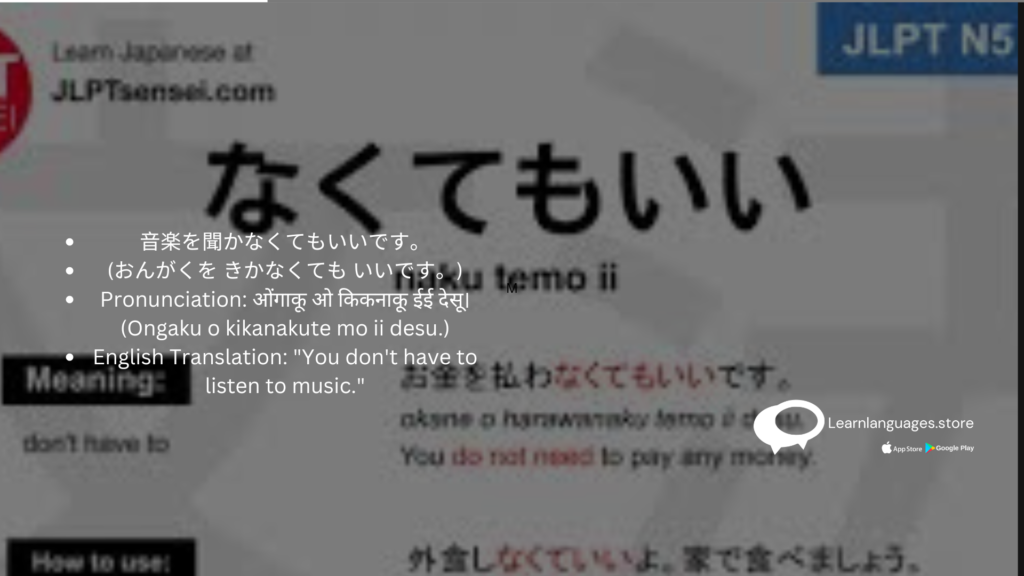Unveiling the Freedom of 〜なくてもいいです (nakutemo ii desu) in Japanese Grammar
Unveiling the Freedom of 〜なくてもいいです (nakutemo ii desu) in Japanese Grammar
Estimated reading time: 3 minutes
こんにちは (Konnichiwa)! Today, we embark on a journey through the liberating realm of Japanese grammar with the versatile expression 〜なくてもいいです (nakutemo ii desu). This delightful phrase empowers you to express permission, allowance, or lack of necessity with ease. In this comprehensive blog, we’ll unravel its structure, explore various examples with a touch of humor, and delve into exceptions and usage nuances. Get ready to embrace linguistic freedom like never before!

Unpacking 〜なくてもいいです (nakutemo ii desu)
Sentence Structure
The structure of 〜なくてもいいです (nakutemo ii desu) is quite straightforward. It consists of:
- Verb/Negative Form of Verb + なくても + いいです
Examples with Different Contexts
- Permission:
- Example: 音楽を聞かなくてもいいです。(おんがくを きかなくても いいです。)
- Pronunciation: ओंगाकू ओ किकनाकू ईई देसू। (Ongaku o kikanakute mo ii desu.)
- English Translation: “You don’t have to listen to music.”
- Humorous Twist: “सुनना है, तो सुनो; नहीं तो मेरी आवाज़ को बरबाद करने की कोशिश मत करो!”
- Lack of Necessity:
- Example: この本を読まなくてもいいです。(このほんを よまなくても いいです。)
- Pronunciation: कोनो होन ओ योमनाकू ईई देसू। (Kono hon o yomanakute mo ii desu.)
- English Translation: “You don’t have to read this book.”
- Humorous Twist: “क्या तुम ये पढ़ना चाहते हो? नहीं? तो फिर क्यों रोज़ ये देखते हो?”
- Allowance:
- Example: コーヒーを飲まなくてもいいです。(こーひーを のまなくても いいです。)
- Pronunciation: कोही ओ नोमनाकू ईई देसू। (Koohii o nomanakute mo ii desu.)
- English Translation: “You don’t have to drink coffee.”
- Humorous Twist: “आज कोई नहीं पीएगा? कोई नहीं? ठीक है, तो मेरे लिए रखना!”
Usage and Exceptions
General Usage
- Permission: Indicates that an action is not required.
- Lack of Necessity: Expresses that something is not necessary.
- Allowance: Grants permission or freedom from obligation.
Exceptions
While 〜なくてもいいです (nakutemo ii desu) is generally straightforward, it’s essential to distinguish it from similar expressions like 〜なくてもかまいません (nakutemo kamaimasen), which also means “it’s okay not to do.”
Identifying 〜なくてもいいです in a Sentence
Look for the structure Verb/Negative Form of Verb + なくてもいいです, indicating permission, lack of necessity, or allowance.
Conclusion
In conclusion, 〜なくてもいいです (nakutemo ii desu) is a linguistic gem that offers you the freedom to choose in Japanese conversations. Whether granting permission, expressing lack of necessity, or allowing flexibility, this expression adds richness and nuance to your language skills. So, embrace its versatility, practice with our humorous examples, and enjoy the liberation it brings to your Japanese journey!
Learn Languages Store
Vashi,
Email: services@learnlanguages.store
-
Product on sale
 Japanese N3
Japanese N3₹42,600.00
₹62,600.00 -
Product on sale
 Japanese N4
Japanese N4₹24,300.00
₹32,600.00 -
Product on sale
 Japanese N5
Japanese N5₹18,300.00
₹24,300.00










